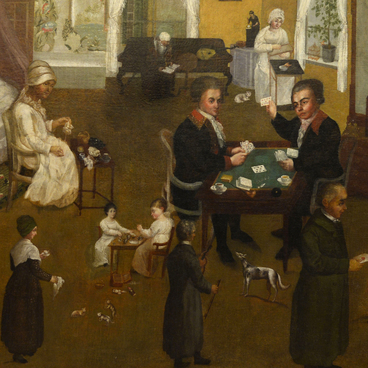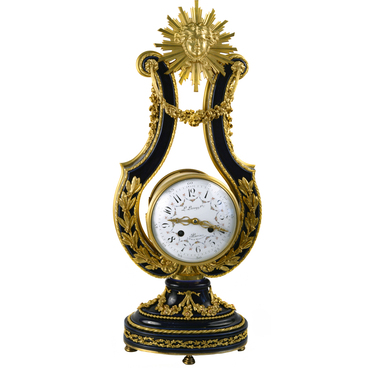The museum’s exhibition displays the gramophone record of 1938, which was made in the USSR. It is the only Soviet record of the 1930s decorated with thematic pictures. There are four Navy ships and three airplanes on one side, and the flag of the Navy in the foreground. The reverse side of the record features two three-turret tanks, three airplanes, and the flag of the USSR. Both sides have the authors and song titles at the bottom of the record.
“The Song of the Red Fleet” is recorded on one side. It is performed by the artists of the State Academic Bolshoi Theatre — Solomon Khromchenko and Peter Kirichek. On the other side, there is “If War Comes Tomorrow” performed by the Red Army Choir and conducted by Alexander Alexandrov.
The record was made at the Aprelevka Record Plant near Moscow using a complex experimental technique. A paper illustration was placed on a shellac backing covered with cellulose acetate and the soundtracks were recorded.
The Aprelevka Record Plant was producing gramophone records in the 1930–1940s. The plant was opened on April 1, 1910, by the German businessman Gottlieb Moll and his son Ivan. Gottlieb Moll was usually called Bogdan Vasilyevich in Russia. The golden age of the company came during the Soviet era. It was at this factory that Vladimir Lenin recorded his speeches. In 1925, it was renamed as the Factory “In Memory of 1905”, and later it was renamed as the Aprelevka Record Plant “In Memory of 1905.”
At the beginning of the 1930s, the enterprise considerably expanded. More than a thousand workers were employed during that time. The Aprelevka Record Plant became one of the main producers of records in the USSR. Annually it produced about 19 million records. In the first days of the World War II, the Red Army Choir recorded the song “The Sacred War” for the first time. During the war, the plant produced aerial bombs. Later the record production was resumed.
In 1952, the plant began producing long-playing records and later, in 1961, — stereo records. In 1964, The Aprelevka Record Plant became a part of the Soviet record company called “Melodiya” [“Melody”]. By the early 1980s, the plant was already producing over 50 million records a year.
In the 1990s, record production virtually stopped. The plant began to operate at a loss. Later, the plant tried to switch to the production of audiocassettes, but in 2002, it was declared bankrupt and closed.
“The Song of the Red Fleet” is recorded on one side. It is performed by the artists of the State Academic Bolshoi Theatre — Solomon Khromchenko and Peter Kirichek. On the other side, there is “If War Comes Tomorrow” performed by the Red Army Choir and conducted by Alexander Alexandrov.
The record was made at the Aprelevka Record Plant near Moscow using a complex experimental technique. A paper illustration was placed on a shellac backing covered with cellulose acetate and the soundtracks were recorded.
The Aprelevka Record Plant was producing gramophone records in the 1930–1940s. The plant was opened on April 1, 1910, by the German businessman Gottlieb Moll and his son Ivan. Gottlieb Moll was usually called Bogdan Vasilyevich in Russia. The golden age of the company came during the Soviet era. It was at this factory that Vladimir Lenin recorded his speeches. In 1925, it was renamed as the Factory “In Memory of 1905”, and later it was renamed as the Aprelevka Record Plant “In Memory of 1905.”
At the beginning of the 1930s, the enterprise considerably expanded. More than a thousand workers were employed during that time. The Aprelevka Record Plant became one of the main producers of records in the USSR. Annually it produced about 19 million records. In the first days of the World War II, the Red Army Choir recorded the song “The Sacred War” for the first time. During the war, the plant produced aerial bombs. Later the record production was resumed.
In 1952, the plant began producing long-playing records and later, in 1961, — stereo records. In 1964, The Aprelevka Record Plant became a part of the Soviet record company called “Melodiya” [“Melody”]. By the early 1980s, the plant was already producing over 50 million records a year.
In the 1990s, record production virtually stopped. The plant began to operate at a loss. Later, the plant tried to switch to the production of audiocassettes, but in 2002, it was declared bankrupt and closed.



